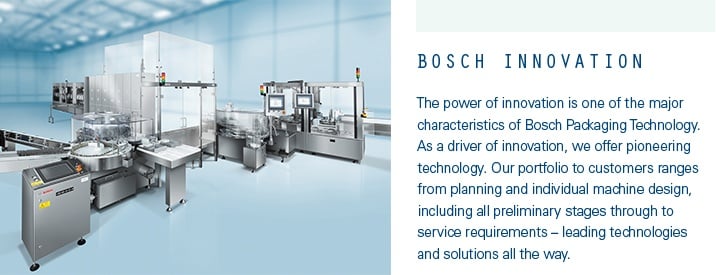Nice Insight is in conversation with Uwe Harbauer, Senior Vice President, Pharma Business Unit, Bosch Packaging Technology, to discuss how equipment supplier/pharma company relationships have changed over time, including the growing importance of longer-term, more strategic interactions.
The pharmaceutical industry has been experiencing significant change in recent years, and the relationships between equipment suppliers and their pharmaceutical manufacturing customers have not been immune. In this era of innovation, drug makers expect equipment manufacturers to provide much more than pieces of machinery — they expect comprehensive solutions that help support all aspects of manufacturing, from achieving competitive costs and production timelines to meeting regulatory compliance requirements.
Need for higher equipment precision and flexibility
In the past, most pharmaceutical manufacturers produced large batch sizes on robust equipment and expected equipment suppliers to meet their very detailed user requirement specifications, according to Uwe Harbauer, Senior Vice President, Pharma Business Unit, Bosch Packaging Technology. A lot has changed since then, not only in terms of drug development, but also regarding project planning, expectations and the role of equipment manufacturers. “We are no longer solely delivering single machines. Our customers expect us to deliver complete solutions that provide much more than mere technical or mechanical expertise,” he explains.
We must be able to answer questions such as ‘What will regulatory changes mean for our customers’ production processes?’ ‘Which equipment needs to be modernized or upgraded?’ And ‘How can existing processes be implemented with new guidance?’
What has driven this important change in the role of equipment suppliers? In part, the need for ever-higher precision and flexibility of equipment. “Smaller batch sizes and different packaging types are required for biopharmaceuticals and personalized medicine. Drug manufacturers expect the same flexibility from their suppliers. In addition, our customers want a partner along their value chain and throughout their projects,” says Harbauer.
Moreover, the interconnection of machines, lines, processes and IT is becoming more and more important. He notes that this connectivity and flexibility is easiest to find with a partner that can deliver everything from a single source. “At Bosch Packaging Technology, we recognized this trend at an early stage and have been expanding our portfolio ever since through internal innovation, acquisitions such as Eisai Machinery in 2012, and joint ventures — for instance — with Klenzaids in 2015.”
Expectations for in-depth knowledge
While having specific drug expertise will always remain the key competence of pharmaceutical companies, drug manufacturers increasingly expect their suppliers to have in-depth knowledge about filling, isolating, packaging and the like, as well as which product characteristics demand which type of solution, according to Harbauer. “Our job has evolved from an equipment expert to the role of consultant; we are responsible for finding the optimum solution for a specific product — a role we identify with very well.”
For instance, Bosch focuses on knowing the different markets and regions, being up-to-date with all regulatory requirements, identifying new trends and remaining in constant contact with its customers. “Apart from our standard portfolio,” Harbauer asserts, “we need to be able to deliver customized line concepts for any kind of pharmaceutical requirement. That’s what makes us the ideal partner for all pharmaceutical needs and a true full-range solutions provider.”
He adds that next to Bosch’s machinery know-how, the company also offers its customers comprehensive pharma services in its laboratories. Customers receive advice and support in formulation development, process design and equipment use. “With a large range of after-sales services such as modernization, maintenance and training, we further support customers to flexibly adapt their existing machines and lines to future market requirements,” notes Harbauer.

Governments, payers and patients are looking for drugs that provide significant improvements in health and quality of life, compared to existing products, while being easier and more convenient to access and all at a lower cost.
“Our goal is to support our customers in bringing successful drugs to the market that help save lives. We don’t just work with them on a project basis; we care about their pharmaceutical products, the entire lifecycle of their lines, their needs and, in the end, about their success,” he continues. As a result, the customer relationship does not stop when Bosch delivers a piece of equipment. The company’s focus on Overall Equipment Effectiveness (OEE) is integral to this approach. “The goal is to further achieve systematic optimization for our customers. Every percentage we manage to raise the OEE is a valuable success — and we have achieved this more than once in joint customer projects,” he observes.
In fact, Bosch has many long-lasting relationships with its customers, working together on long-term projects that include consulting, planning and development, and expand beyond the scope of implementation. One such relationship is with a leading contract manufacturing organization (CMO). Nearly all of the CMO’s equipment is from Bosch, and the two companies have been working closely together for many years. In one joint project, a machine concept to address the scalability of a filling device for liquid pharmaceuticals was developed based on the user experience approach. The equipment was built and then installed and tested at the customer’s facility. It is currently used for many different projects, providing highly relevant data and easy scale-up of their operations, according to Harbauer.Evolving with the contract services sector
The role of CMOs and contract development and manufacturing organizations (CDMOs) is expanding significantly as drug manufacturers increase their reliance on contract service suppliers throughout the lifecycle of new and existing drugs. “CMOs and CDMOs have experienced tremendous growth as more and more processes are being transferred to their facilities. As a result, they no longer simply fill drug A into packaging B and put this packaging into a folding carton; their equipment requirements are sometimes even more diverse than those of a large drug producer because they have an even larger project variety,” Harbauer observes.
On the one hand, CMOs/CDMOs require dedicated lines that are tailored exactly to one single customer product. On the other, they also need highly flexible lines that are able to run different products from different customers. “These dual needs demand the highest possible flexibility combined with fast changeover, cleaning and validation times,” he says.

What has driven this important change in the role of equipment suppliers? In part, the need for ever-higher precision and flexibility of equipment.
Supporting regulatory compliance
Proactive compliance is key to successful manufacturing operations. Monitoring the regulatory environment and supporting its customers at very early stages of their projects, or even before they start, is an integral part of the company’s regular consulting activities, according to Harbauer. He points to the revision of USP General Chapter 1207 on Container Closure Integrity, EU GMP Annex 1, and the different national guidelines on serialization as key examples of newer regulations that are impacting Bosch’s customers.
“Knowing the market and regulatory requirements is part of our everyday business,” he asserts. “We must be able to answer questions such as ‘What will regulatory changes mean for our customers’ production processes?’ ‘Which equipment needs to be modernized or upgraded?’ and ‘How can existing processes be implemented with new guidance?’ By constantly asking ourselves these questions and by participating in discussions and dialogue, we are able to offer our customers solid advice. Our experts know exactly what is happening and can incorporate this knowledge into all projects and equipment developments.”

Facilitating patient-centric development strategies
Changing expectations for new drug products are also impacting pharmaceutical industry innovators, contract service providers and equipment suppliers. Governments, payers and patients are looking for drugs that provide significant improvements in health and quality of life, compared to existing products, while being easier and more convenient to access — and all at a lower cost. As a result, patient-centered development strategies are now an important component of most drug development programs. Equipment manufacturers have a role to play here, too.
“Faster time-to-market, easier scale-up, the highest product quality and OEE — these are some of the demands on the agenda when Bosch builds equipment. By offering our customers fast consulting and straightforward solutions, we support them in achieving their strategic goals. With our large base of experts, we are able to deliver specific solutions for high-quality products, for instance with zero product loss, sophisticated containment and isolator technology,” states Harbauer.
With respect to the development of patient-oriented medical devices, he notes that Bosch supports its customers through the development of novel technologies, such as those for the assembly of pens and auto-injectors. “The solutions we have provided our pharmaceutical customers enable them to meet patient requirements for safety, convenience and adherence, as well as support them in living healthier lives,” Harbauer concludes.

